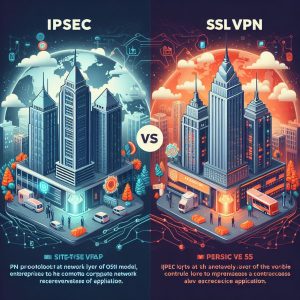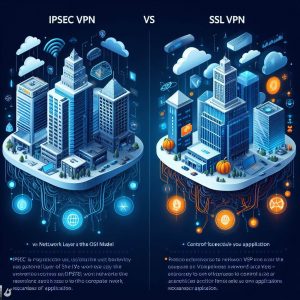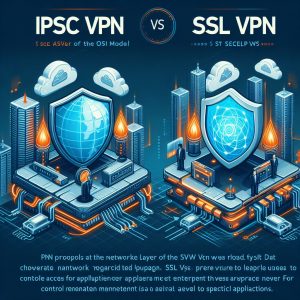I. Introduction
VPNs (Virtual Private Networks) have become an essential tool for protecting data in transit over the internet. By encrypting connections and traffic, VPNs prevent unauthorized access to sensitive information. There are two main types of VPN protocols – IPsec VPN and SSL VPN. While they share some common capabilities, there are also key differences in how each one secures connections.
This article will take an in-depth, comparative look at IPsec and SSL VPN technologies. It will define what each type of VPN does, explore their technical components, analyze their relative security strengths and weaknesses, and highlight factors to consider when deciding between them. Properly evaluating the merits of IPsec vs SSL VPNs allows matching specific use case requirements to the optimal underlying VPN solution.

II. IPsec VPN
IPsec (Internet Protocol Security) represents one of the most widely used VPN standards, providing strong encryption for all internet traffic flowing through a tunnel between devices or networks.
What is IPsec VPN? IPsec VPNs utilize the Internet Protocol Security protocol suite to authenticate and fully encrypt traffic via VPN tunnels. Utilizing complex cryptography and security mechanisms, an IPsec connection requires installation of VPN client software to create protected pathways for remote access clients and internal corporate networks to securely communicate through.
How IPsec VPNs Work IPsec utilizes the concept of establishing virtual tunnel relationships between devices known as Security Associations. These enforce confidentiality through encryption algorithms securing data flows across the tunnel interface. Anti-replay protection guarantees packets are not intercepted or duplicated within the connection. While complex under the hood, IPsec VPN clients provide an easy way to launch and route traffic through these encrypted VPN tunnels.
Common IPsec VPN Uses IPsec VPNs see widespread enterprise usage securing remote access and site-to-site connectivity for employees, networks, and applications that deal with highly sensitive data. The full encryption model makes an IPsec VPN optimal for infrastructure components that need omnidirectional security across the entire internet traffic stack versus just application data.
Pros
Some benefits afforded by IPsec VPN technology include:
- Total network traffic encryption
- Fine-tuned control over almost all facets of the VPN tunnel
- Mandatory access granted on a case-by-case basis
Cons
Downsides to consider around IPsec VPN technology encompass:
- Configuration complexity requiring IT expertise
- Lack of scalability for large deployments
- VPN client installation needed on every device
Underlying Technology Components Critical technologies and protocols leveraged by IPsec VPN connections consist of:
- Internet Key Exchange version 2 (IKEv2) handles the mutual authentication between VPN server and client while also facilitating session key generation used within the IPsec tunnel itself for encrypting traffic flows via agreed parameters around security standards being enforced, encryption & hash algorithms adopted, etc. Diffie-Hellman key exchange integrates within IKEv2.
- Encapsulating Security Payload (ESP) provides confidentiality, data origin authentication, connectionless integrity and anti-replay services through encryption. ESP authenticates the sender and blocks unauthorized parties from modifying message contents.
- Authentication Header (AH) guarantees data integrity and authentication on every IP packet transmitted through the tunnel while detecting any changes to packet data via hashing. However, AH does not actually encrypt packet contents directly.
IPsec VPN vs. SSL VPN Fundamentally, SSL VPNs employ asymmetric public/private key pairs for encrypting communication at the application layer of the OSI networking model rather than baking encryption into the network layer like IPsec VPNs leverage. Hence IPsec handles security across the full spectrum of IP traffic, while SSL narrowly targets application-level data.
III. SSL VPN Secure Sockets Layer and its more modern Transport Layer Security (TLS) cryptographic protocols are also commonly harnessed for VPN connectivity – forming SSL VPNs.
What is SSL VPN? SSL VPN allows remote client access to internal corporate applications and resources facilitated through a secure, encrypted SSL/TLS tunnel. This leverages web browsers as clients rather than needing pre-installed VPN software. End user devices form VPN channels “on-demand”, requiring less IT administration effort.

How SSL VPN Works
Because SSL VPNs rely on secure webpage connectivity conveying encrypted traffic flows in the form of HTTP responses loaded within browsers, no specialized client software is necessary. Web-proxied application access means users invoke protected pathways to authorized resources only when needed rather than keeping perpetual VPN tunnels active.
Common SSL VPN Use Cases Thanks to easy browser-based deployments, SSL VPN usage permeates organizations supporting external partners, individual remote staff, work-from-home access needs and basic site-to-site links between branch offices, data centers or cloud environments where controlled connectivity suffices over total IP traffic encapsulation typical with IPsec.
Pros Advantages around properly leveraging SSL VPNs include:
- Simplified remote user access
- Granular policy control over application/network resource access permissions
- Support for a wider range of endpoint devices
Cons Limitations organizations may encounter with SSL revolve around:
- Data privacy vulnerabilities on public networks
- Reliant on third-party root certificates
- Session maintenance expirations
SSL VPN Technology Components Core technologies enabling SSL VPN capabilities consist of:
- Transport Layer Security (TLS) successor to SSL – facilitates authentication, privacy and data integrity between two communicating computer applications. TLS involves certificates, hash algorithms and asymmetric cryptography for security.
- Secure Shell (SSH) Utilizes public-key cryptography to facilitate remote login sessions and other secured network services between two networked devices. Primarily deployed to access text-based command line interfaces on remote systems or servers.
- Multipurpose Internet Mail Extension (MIME) Enables sending additional payloads of information across standard SMTP, defining content type headers so messages are correctly parsed. Allows encrypting message bodies themselves, attachments or other embedded resources.
IPsec VPN vs SSL VPN IPsec intrinsically weaves VPN access into the lower networking layers to deliver total site-to-site security. SSL VPNs offer a more flexible, web-based model for granular user or application data protection – but with potential gaps allowing endpoint exploits around unencrypted content delivered externally outside the VPN tunnel itself if not carefully firewalled.
IV. Comparison Between IPsec & SSL VPNs
Now that foundational knowledge has been established around what exactly IPsec and SSL VPNs are on a technical level, it’s possible to draw direct side-by-side comparisons across relevant decision-making criteria:
Speed & Performance IPsec VPNs carry more computational overhead around encrypting end-to-end traffic with algorithms like AES-256 applied omnidirectionally. However SSL only encrypts selective application payload data. Therefore SSL VPN throughput bandwidth ceiling is higher than IPsec generally – however IPsec aims to hide the entire IP footprint which is more resource intensive by design.
Security Risk Management
Arguably IPsec VPNs provide substantially greater depths of security – encompassing traffic threats like man-in-the-middle attacks, session hijacks or endpoint malware. SSL relying on web domains faces greater potential attack surfaces. However SSL VPN access limitations help minimize damage chances although data could still be intercepted externally before entering or after exiting the VPN tunnel space itself during transmission.
Technology Composition IPsec utilizes venerable enterprise VPN protocols like IKEv2 or older standards such as L2TP/IPsec weaved integrally into device operating systems and layered deeper in the network stack. SSL VPNs harness web protocols like HTTPS for facilitating proprietary socket tunnels only conveying certain permitted traffic flows in application space.
Maintenance & Configuration SSL VPN systems possess simpler deployment hurdles accessed through web URLs and browser plugin installations. Meanwhile IPsec VPN clients demand pre-configuration spanning firewall rules, address allocation, device settings across endpoint machines, which raises time investments administering VPN access permissions. SSL user access relies more on relative sessions and expiring tokens.

V. Conclusion
Deciding between whether an IPsec or SSL-based virtual private network solution makes the most sense requires carefully weighing intended use cases against each VPN technology’s comparative strengths and weaknesses.
Balancing endpoints needing connectivity, types of data assets being transferred, existing business infrastructure complexity, local expertise administering systems, and cost constraints are all critical inputs towards determining if SSL’s selective access models or IPsec’s blanket encryption approach fulfills security responsibilities adequately.
IT professionals may use these comprehensive VPN evaluations highlighting key metrics like performance impact, vulnerabilities protected against, ease of management, accessibility requirements and transparency needs to construct informed, unbiased recommendations around matching IPsec or SSL capabilities towards fulfilling specific organizational privacy and access demands at hand. There exist merits to both implementations – choosing correctly rests on needs not vendor marketing.
By establishing clarity upfront around must-have capabilities spanning speed, risk prevention scope, configuration barriers and flexibilities – while ignoring assumptions or personal bias – the optimal IPsec vs SSL VPN environment naturally reveals itself positioning teams for success safeguarding assets long term. Approaching IT solutions through an impartial, structured lens leads to ideal outcomes.